Sandra Shaw Homer's Blog, page 9
June 24, 2016
Can You Taste It?
I feel I gave the sense of taste short shrift when I all I could think to do was feature the hyperbole of food writers. So see how this one tastes. Excerpted from the forthcoming memoir, Evelio’s Garden.
One of my chores on the verandah has been to cut back the basil. I have seven pots of it out there, all gone leggy and struggling with aphids. Evelio’s organic insecticide is the most potent thing I’ve ever used on these aphids, but they need to be sprayed directly in order to be killed, and when there’s a lot of foliage some get missed. A drastic cutting-back was the only solution. The infected branches I simply tossed over the rail, but the healthy ones were starting to accumulate in my basket in a sufficient quantity to make Rosa pause, in her mopping of the deck, to ask me whether I made pesto with macadamia or pine nuts.
Until that moment, it hadn’t occurred to me to make pesto. I hadn’t thought at all what to do with all this basil, but pesto sounded like a good idea. I had both macadamia and pine nuts in the house (the macadamias are local, the pine nuts a treasure brought by my friend Shirley from a small town 400 miles north of Toronto), plenty of garlic and extra virgin olive oil, even real, imported-from-Parma Parmesan cheese. I hadn’t made pesto in years, since jars of it often make their way into the Tilarán supermarkets, and washing and pulling off all those leaves from the stems is a chore.
Italian pesto isn’t a staple of the Costa Rican diet, but Rosa worked for many tourist seasons at an Italian restaurant near here. So when I had it all made up, I invited her to sample it.
“Better,” she said. “At the restaurant they don’t use any cheese. And why would theirs be runnier? Too much oil? Why wouldn’t they use cheese – because it’s cheaper?”
I confessed that, yes, no cheese certainly made their pesto cheaper. I pulled out a jar of the commercial stuff and read the list of ingredients; no cheese there either. I dipped my spoon into the lovely pale green paste I had just made, closed my eyes, and . . . ah, so densely green and nutty, with just enough cheesy sharpness to make all the difference.
© Sandra Shaw Homer, 2016
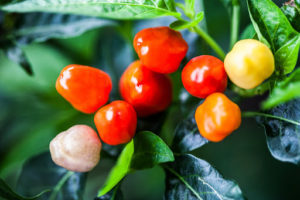
Photo by Marten Jager
June 14, 2016
The Joie de Vivre Comes from Within
“I am an ordinary person with an ordinary life. Even my acceptance of ordinariness is ordinary, the undercurrent of so many ‘big books.’ Madam Bovary, War and Peace, Freedom. The mistake is always the same: trying to live the life one has in one’s head instead of the life before one, which is endlessly generous if you humble yourself to it as the only possible means of fulfillment.” — Tennant-Moore
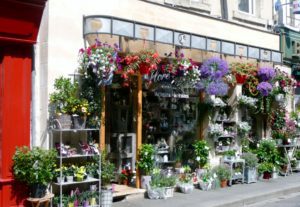
Photo by SSH
May 5, 2016
We Travel to Discover Ourselves
“The great stillness in these landscapes that once made me restless seeps into me day by day, and with it the unreasonable feeling that I have found what I was searching for without ever having discovered what it was.” Peter Matthiessen
“A good traveler has no fixed plans and is not intent on arriving.” Lao Tsu
“Living abroad, traveling, both experiences simplify our lives. At home, the web of our social life, work life, of our responsibilities, even our amusements and pleasures, all conspire to complicate our experience. However good the life, it distracts us. Traveling we (can) leave much of that distraction behind. In the simpler world of traveling, experiences come to us one at a time. So they register more clearly. And there is more time to mull, to consider the kind of surprising connections that, for me at least, often lead to an essay or a story. Occasionally even to a poem. I get back to first questions, questions about how meaning is made and sustained.
“Oddly enough, perhaps, something similar happens in writing about travel or the expat life. Much of the clutter of living disappears; it’s easier for me to arrive at clarity and, I probably shouldn’t say, to approach mystery.
“. . . I travel hoping to get further in, to find in the world and myself a common humanity. I travel to awaken from the trance of our culture, the trance that leads us to assume that our ways are the ways. To travel is to know, to feel, that our ways are our ways and that’s all. I consider it a good trip if I suffer as much “culture shock” coming home as going.
“And I travel for beauty, to be undone by beauty. Just for the oh of it. To be always alert would be to see beauty everywhere, I suppose, but, fallen as we are, the beauty that is always there is just more available traveling. And I want it.”
Kevin Oderman, from an interview in Brevity: A Journal of Concise Literary Nonfiction, Fall 2015

Chart of Panama Canal, Photo by SSH
March 12, 2016
The Echoes of Sound
The following is an excerpt from the forthcoming memoir, Evelio’s Garden.
When the first Red-lored Parrots fly over in twos and threes, always easterly, my ears still remember the calls of the Canada geese on their southward run in the autumns of the north. Philadelphia is on the Great Eastern Flyway and, even in the center of the city, the call of the geese overhead reminded us of the wild places and cold sunsets on the Chesapeake Bay.
It was a haunting, hollow sound, a sound of echoes and lost places. My brain is still hard-wired to recognize those sounds and memories, even after so many years in a tropical country, far from the wintering grounds of the geese. And it takes me a day or two to realize that what I’m hearing is a bird the color of new leaves with a blunt head and a red patch above its beak that loves to gather by the hundreds in the trees and shake them to death while noisily deliberating what to do next.
A large flock of parrots cased the jocote tree today and determined, after a few raucous minutes, that the fruit wasn’t ready yet, and so they peeled off, some landing in the tops of the three eucalyptus trees next to the house, bending the slender topmost branches like a big wind, until they continued on their way.
In the North, the flights of the geese always pulled at me in a particular way, made me ache for other destinations, a less complicated life. They called to me of a simpler, richer time, a freedom and a dignity that our modern lives had lost. The parrots harken to the same impulse in me, except that now I smile at the birds, at their noisy antics, and at my old associations, and I am reminded that what I have chosen for myself is a life infinitely richer than what I had before.
© SandraShaw Homer, 2016
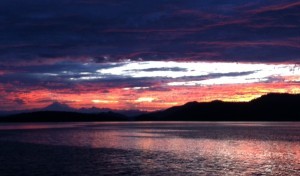
Photo by Alison Shaw
January 28, 2016
Encouragement for Memoirists
“Your life ends up being made up of the things you remember. You forget most of it, but the things that you remember become your life. And if you can make something that someone remembers, then you’re participating in their life. There’s something really meaningful about that. If feels like something worth trying to do.”
— Doug McGray,
Co-founder and editor-in-chief, California Sunday and Pop-up Magazine
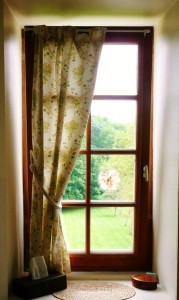
Photo by SSH
January 3, 2016
“A detailed, rare, and rewarding ride over a watery part of the world.”
49 Days on a Cargo Ship
by Sandra Shaw Homer
Debut author Homer chronicles her experiences traveling via cargo freighter.
Homer’s first book is an adventure story—the journal of her 49-day trip through the South Pacific as a passenger on the Louise, a cargo freighter. The author hates flying, and had no interest in a cruise ship’s gorging and gambling, so she decided, why not rough it? From Costa Rica to Australia and back, by way of Tahiti, Fiji, New Caledonia, and New Zealand, the Louise churned its 45,000 tons (cargo and author included) into the “open-ended silence of the sea.” Its passenger comes away with plenty of good stories to share along with “a decidedly unromantic view of the life of a seaman.” In Fiji, Homer missed out on seeing Raymond Burr’s orchids but did visit a pricey resort with “a man-made island in the shape of a giant footprint.” In former colonial islands, she discovered to her chagrin that “the French seem always to be French, no matter where they are.” The glorious and the grim are each delineated in detail, from the “foreign country of constellations in the sky” to the constant awareness that “a freighter is a noisy, dirty, smelly beast.” The aches and pains of travel are here in full measure: the cold of the ship, the pangs of arthritis in her knees, and the limbs barked against listing furniture. Because much of the journal comprises minimally edited diary entries and letters to friends, the reading experience can be choppy, especially since past and present tense mingle freely. But because of the immediacy of the reporting, Homer’s character—questing, worrying, laughing—comes across with terrific clarity. We come to know her well, or feel as though we do, and the curious world of cargo ports and the crews that visit them become even more intriguing through her eyes.
A detailed, rare, and rewarding ride over a watery part of the world. — Kirkus Reviews
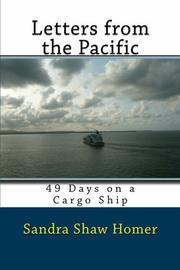
December 12, 2015
A Christmas Moment
This “moment” is excerpted from the forthcoming, Evelio’s Garden: Memoir of a Gringa Naturalist in Costa Rica.
The extra-rich biodiversity of Costa Rica includes amoebas, one species of which has been bugging me off and on for several months. Each time, it seems to take a different medicine to rid me of the thing, which means the process drags out over several weeks during which eating is just a plain chore.
As I do every Christmas morning, I visited a few local families to swap out homemade gingerbread for tamales, and at one house I happened to mention my amoeba. Alba, mother of three, said she had cured one of her boys of an amoeba recently with the bark of the olive tree – la cáscara de aceituno. Her husband Mariano volunteered to take me to a nearby farm where he could whack off some more of this bark with his machete.
The farmer came out to greet us and be introduced. He was pleased to offer the bark of his tree if it would make the señora feel better. While Mariano trekked downhill to the tree, I waited at the edge of the pasture in the weak sunlight, observing the make-shift rusty tin-roofed sheds and cheap plastic plumbing fittings around me, smelling the cow manure, realizing that this poor family had been on this land for a long time, cluttering up the farmyard in whatever ways necessary to house and care for their chickens and cows.
There were a few scraggly fruit trees dotting the landscape, just as abandoned as ours at home. Mariano snagged an orange from one as he came back up the hill.
I read in the paper the other day that the cost to produce a tamal has gone up by 30 percent this year. Mariano’s family is indeed poor, so to spare four tamales for me is a stretch. The only additional gift they can give is their time and care, so I was keenly aware, as I waited for Mariano on that poor farm, that this was truly a Christmas moment.
© 2015 Sandra Shaw Homer
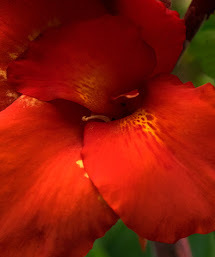
Photo by Rick Brazeau



